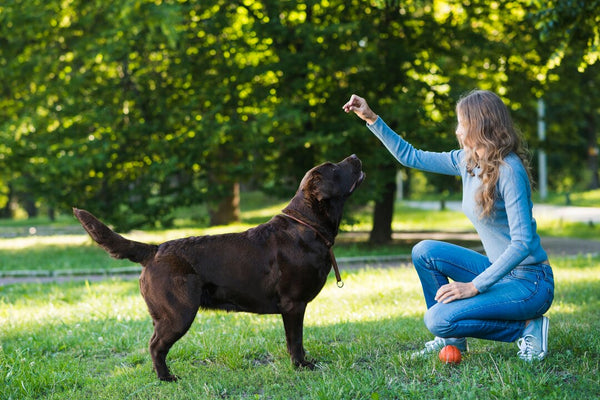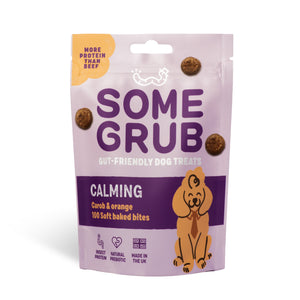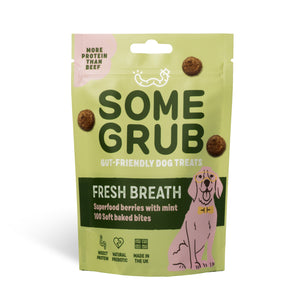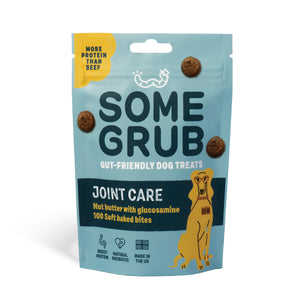Dog Health Hub
Everything you need to know to keep your best friend happy and healthy’
Dog Allergies
Is hypoallergenic dog food better for my dog?
Oct 24, 2023
Explore the world of hypoallergenic dog food, tailor-made for pups with food allergies or sensitivities. Uncover the use of unique proteins like venison, duck, and insects to reduce allergic reactions. Learn how this nutritious option provides a safe, balanced diet
Read more
How Can Probiotics Help My Allergic Dog?
Oct 23, 2023
This comprehensive guide will help you understand the role of probiotics in managing allergies in dogs, how to choose the right probiotic supplement, and when to consult your vet for professional advice.
Read more
How to Treat Your Dog’s Food Intolerance
Oct 17, 2023
In this article, we explore several facets of food intolerance in dogs, from identifying symptoms to avoiding trigger foods, and how to consult with your vet.
Read more
Is Grain-Free Dog Food Better for Allergies?
Oct 13, 2023
Let's delve into the nitty-gritty of this topic to provide a comprehensive understanding.
Read more
Is My Dog Allergic to Wheat? Navigating Canine Dietary Concerns
Oct 11, 2023
The burning question: "Is my dog allergic to wheat?" requires a deep dive, and this guide aims to provide clarity.
Read more
Is My Dog Allergic to Beef? A Deep Dive into Canine Food Allergies
Oct 6, 2023
Let's dive deep into this topic, keeping in mind the health of our beloved pets and the sustainability of our planet.
Read more
Should I Give My Dog Antihistamines?
Oct 3, 2023
As a loving dog owner, it is natural to want to protect your furry friend from...
Read more
Is My Dog Allergic to Fish? Unraveling Canine Dietary Sensitivities
Oct 3, 2023
Introduction
As the bond between humans and their canine companions deepens, t...
Read more
Is My Dog Allergic to Chicken? Understanding Canine Food Sensitivities
Oct 2, 2023
In this comprehensive guide, we'll delve into canine chicken allergies, symptoms, and sustainable alternatives.
Read more
What Are the Most Common Food Allergies in Dogs?
Oct 2, 2023
In the bustling world of pet care, discerning what is best for your dog can sometimes be a complex endeavor. One of the critical aspects to focus on is understanding the food allergies that can afflict our furry friends. In this guide, we delve into the world of canine food allergies, identifying common allergens and the steps to prevent, diagnose, and treat food allergies. Let us venture deeper to grasp this critical aspect of canine health.
Identifying Common Allergens
Food allergies in dogs are relatively common, and being cognisant of the potential allergens can be a cornerstone in ensuring the well-being of your dog. Here, we identify some of the most common food allergens in dogs.
Proteins
Beef
Chicken
Lamb
Soy
Grains
Wheat
Corn
Dairy Products
Milk
Cheese
Table 1: Common Food Allergens in Dogs
Category
Allergens
Proteins
Beef, chicken, lamb, soy
Grains
Wheat, corn
Dairy
Milk, cheese
Understanding the common allergens is the first step towards averting potential allergic reactions in your dog.
Symptoms to Look For
Being vigilant about the symptoms of food allergies can foster early intervention, thereby mitigating severe complications. Here are the symptoms to be on the lookout for:
Skin Irritations: Red, inflamed, or itchy skin.
Gastrointestinal Issues: Diarrhoea or vomiting.
Ear Infections: Chronic ear infections can sometimes be a symptom of food allergies.
Respiratory Distress: Though rare, some dogs might exhibit respiratory issues.
Table 2: Symptoms of Food Allergies in Dogs
Symptom Type
Manifestations
Skin Irritations
Redness, inflammation, itching
Gastrointestinal
Diarrhoea, vomiting
Ear Infections
Chronic infections
Respiratory Distress
Rare but possible
Recognising these symptoms early on can be pivotal in ensuring the health and comfort of your dog.
Diagnosis Process
Diagnosing food allergies is a meticulous process that encompasses various steps. Here is a detailed breakdown of the diagnosis process:
Veterinary Consultation
Consult a vet to discuss the symptoms and the dietary history of your dog.
Elimination Diet
Your vet might suggest an elimination diet to pinpoint the exact allergen.
Food Trials
Involves reintroducing individual foods gradually to identify the cause of the allergy.
Table 3: Diagnosis Process for Dog Food Allergies
Step
Description
Veterinary Consultation
Discuss symptoms and dietary history
Elimination Diet
To identify the allergen
Food Trials
Reintroducing foods gradually
Adhering to the diagnostic process is essential to find the root cause of the allergy and formulate a subsequent treatment plan.
Treatment Options
Once a diagnosis is established, a treatment regime can be strategised. Here are the typical steps involved in treating food allergies in dogs:
Dietary Changes
Implementing a diet that eliminates the identified allergens is primary.
Medications
In some cases, your vet might prescribe medications to alleviate the symptoms.
Supplements
Including supplements that bolster the immune system can be beneficial.
Table 4: Treatment Options for Dog Food Allergies
Option
Details
Dietary Changes
Removing allergens from the diet
Medications
To alleviate symptoms
Supplements
Boosting the immune system
Embracing a structured treatment approach can facilitate a swift recovery and enhance the quality of life for your dog.
Prevention Tips
Preventing food allergies involves a series of conscious steps that encompass diet and lifestyle modifications. Here, we delve into some preventative measures:
Balanced Diet: Ensure your dog has a balanced diet that meets all their nutritional needs.
Quality Food: Opt for high-quality dog food that adheres to the necessary safety standards.
Regular Check-ups: Regular veterinary check-ups can aid in early detection and prevention of food allergies.
Table 5: Prevention Tips for Dog Food Allergies
Tip
Description
Balanced Diet
Meeting nutritional needs
Quality Food
Choosing safe and standard food
Regular Check-ups
For early detection and prevention
Implementing these prevention tips can be a cornerstone in averting the occurrence of food allergies in your dog.
FAQs
Q: Can food allergies be cured in dogs?
A: Food allergies cannot be cured but can be managed effectively through dietary modifications.
Q: How long does it take for a dog to show signs of a food allergy?
A: It can vary widely, from a few days to several weeks, depending on the individual dog’s immune response.
Q: Can a dog develop allergies later in life?
A: Yes, dogs can develop allergies at any stage in life.
Conclusion
Understanding the dynamics of food allergies in dogs is pivotal in fostering a healthy and happy life for your canine companion. From identifying common allergens to being cognizant of the symptoms, diagnosis process, and treatment options, every facet holds significant importance.
Incorporating prevention tips into your dog's routine can further mitigate the risk of food allergies. Remember to always consult with a qualified vet to guide you in making informed decisions regarding your dog's diet and health. Armed with this knowledge, you are well on your way to ensuring a joyful, healthy life for your furry friend. Stay informed and nurture a beautiful bond with your canine companion, rooted in care and understanding.
Read more
How to Conduct an Elimination Diet for Dogs
Oct 2, 2023
When dogs suffer from food allergies or intolerances, the go-to strategy for many vets and pet owners is an elimination diet. Let’s unravel the steps and considerations involved in this vital diagnostic tool.
Read more
Why is My Dog Itching So Much?
Oct 2, 2023
This article will guide you through identifying potential causes and selecting appropriate treatments to bring your beloved dog relief.
Read more















